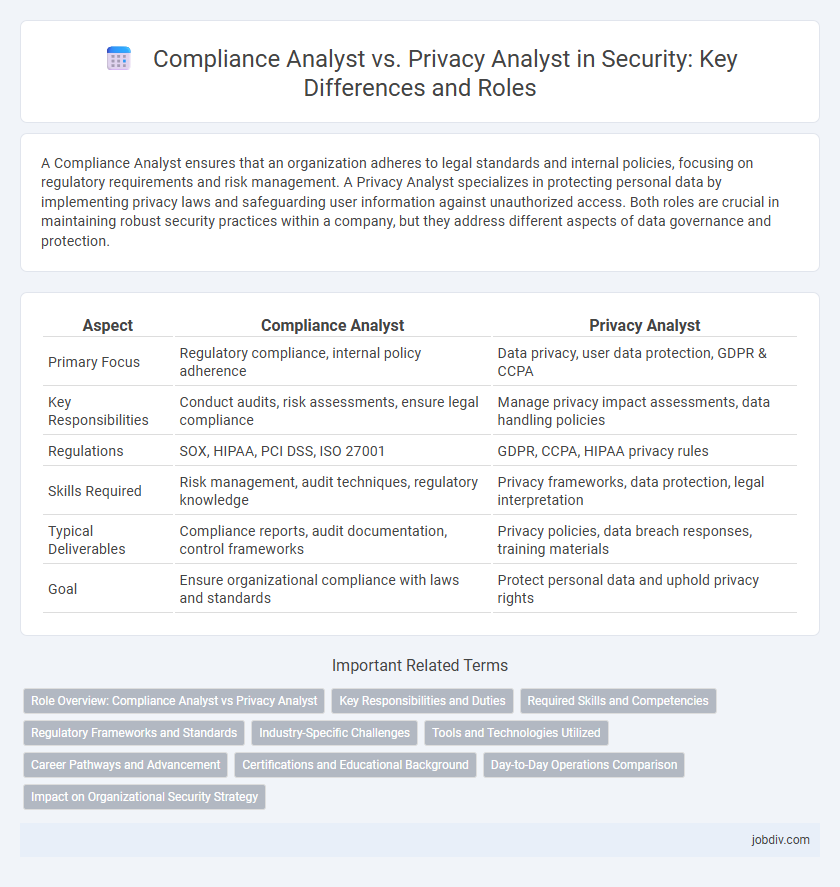A Compliance Analyst ensures that an organization adheres to legal standards and internal policies, focusing on regulatory requirements and risk management. A Privacy Analyst specializes in protecting personal data by implementing privacy laws and safeguarding user information against unauthorized access. Both roles are crucial in maintaining robust security practices within a company, but they address different aspects of data governance and protection.
Table of Comparison
| Aspect | Compliance Analyst | Privacy Analyst |
|---|---|---|
| Primary Focus | Regulatory compliance, internal policy adherence | Data privacy, user data protection, GDPR & CCPA |
| Key Responsibilities | Conduct audits, risk assessments, ensure legal compliance | Manage privacy impact assessments, data handling policies |
| Regulations | SOX, HIPAA, PCI DSS, ISO 27001 | GDPR, CCPA, HIPAA privacy rules |
| Skills Required | Risk management, audit techniques, regulatory knowledge | Privacy frameworks, data protection, legal interpretation |
| Typical Deliverables | Compliance reports, audit documentation, control frameworks | Privacy policies, data breach responses, training materials |
| Goal | Ensure organizational compliance with laws and standards | Protect personal data and uphold privacy rights |
Role Overview: Compliance Analyst vs Privacy Analyst
Compliance Analysts focus on ensuring organizational adherence to regulatory requirements and internal policies by conducting audits, risk assessments, and implementing controls related to security standards such as GDPR, HIPAA, and SOX. Privacy Analysts specialize in protecting personal data by developing and enforcing privacy policies, monitoring data handling practices, and assessing privacy risks aligned with laws like CCPA and GDPR. Both roles require strong knowledge of cybersecurity frameworks, but Compliance Analysts emphasize regulatory compliance, while Privacy Analysts concentrate on data protection and individual privacy rights.
Key Responsibilities and Duties
Compliance Analysts ensure organizational adherence to legal standards and regulatory frameworks by conducting audits, preparing compliance reports, and implementing policies to mitigate risk. Privacy Analysts focus on protecting personal data by developing privacy policies, monitoring data handling practices, and ensuring compliance with data protection laws such as GDPR and CCPA. Both roles require continuous assessment of internal processes to identify vulnerabilities and maintain data integrity and security across the enterprise.
Required Skills and Competencies
Compliance Analysts require strong knowledge of regulatory frameworks such as GDPR, HIPAA, and SOX, along with expertise in risk assessment, audit processes, and policy enforcement. Privacy Analysts emphasize proficiency in data protection techniques, privacy impact assessments, and understanding of privacy laws like CCPA, as well as skills in data mapping and incident response related to personal information. Both roles demand analytical thinking, attention to detail, and effective communication skills to ensure organizational adherence to legal and ethical standards.
Regulatory Frameworks and Standards
Compliance Analysts specialize in ensuring organizational adherence to regulatory frameworks such as SOX, HIPAA, and GDPR by developing internal controls and conducting audits. Privacy Analysts focus on data protection standards like CCPA and ISO/IEC 27701, emphasizing policies that safeguard personal information and manage privacy risks. Both roles require deep knowledge of legal requirements and standards to mitigate regulatory compliance risks effectively.
Industry-Specific Challenges
Compliance Analysts navigate complex regulatory frameworks tailored to sectors such as finance, healthcare, and manufacturing, ensuring organizational adherence to laws like GDPR, HIPAA, and SOX. Privacy Analysts specialize in data protection challenges unique to industries that handle sensitive personal information, focusing on risk assessments, data minimization, and incident response strategies to maintain confidentiality and trust. Both roles require deep industry-specific knowledge to address evolving compliance requirements and mitigate privacy risks effectively.
Tools and Technologies Utilized
Compliance Analysts primarily utilize governance, risk, and compliance (GRC) platforms such as MetricStream and RSA Archer to monitor regulatory adherence and manage audit processes, while leveraging data analytics tools like Tableau for reporting. Privacy Analysts frequently deploy data discovery and classification tools such as Varonis and OneTrust to protect personal information and ensure privacy impact assessments align with GDPR and CCPA requirements. Both roles embrace security information and event management (SIEM) systems like Splunk and automation frameworks to streamline workflows and maintain data security standards.
Career Pathways and Advancement
Compliance Analysts typically advance by deepening expertise in regulatory frameworks like GDPR, HIPAA, or SOX, often moving into senior compliance or risk management roles. Privacy Analysts focus on data protection laws and privacy program implementation, leading to positions such as Data Protection Officer or Chief Privacy Officer. Both career pathways benefit from certifications like CIPP, CISSP, or CRISC, enhancing prospects for leadership roles in cybersecurity and corporate governance.
Certifications and Educational Background
Compliance Analysts often hold certifications such as Certified Compliance & Ethics Professional (CCEP) or Certified Information Systems Auditor (CISA), with educational backgrounds typically in business administration, law, or information security. Privacy Analysts usually pursue certifications like Certified Information Privacy Professional (CIPP) or Certified Information Privacy Manager (CIPM), often possessing degrees in computer science, information technology, or data privacy law. Both roles require strong knowledge of regulations such as GDPR, HIPAA, and SOX, yet Privacy Analysts focus more on personal data protection frameworks while Compliance Analysts address broader regulatory adherence.
Day-to-Day Operations Comparison
Compliance Analysts focus on monitoring organizational adherence to regulatory standards through audits, risk assessments, and policy enforcement, ensuring that operations meet legal requirements consistently. Privacy Analysts concentrate on managing data protection strategies, conducting privacy impact assessments, and addressing data subject requests to safeguard personally identifiable information (PII). Both roles involve detailed documentation and cross-department collaboration, but Compliance Analysts prioritize regulatory frameworks while Privacy Analysts emphasize data privacy laws and user consent management.
Impact on Organizational Security Strategy
Compliance Analysts ensure organizational adherence to regulatory standards and frameworks such as GDPR, HIPAA, and ISO 27001, directly influencing risk management policies and audit readiness. Privacy Analysts focus on safeguarding personal data through privacy impact assessments, data protection strategies, and incident response, thereby enhancing trust and minimizing data breach liabilities. Together, they shape a comprehensive organizational security strategy by aligning legal compliance with proactive privacy measures that protect sensitive information.
Compliance Analyst vs Privacy Analyst Infographic

 jobdiv.com
jobdiv.com